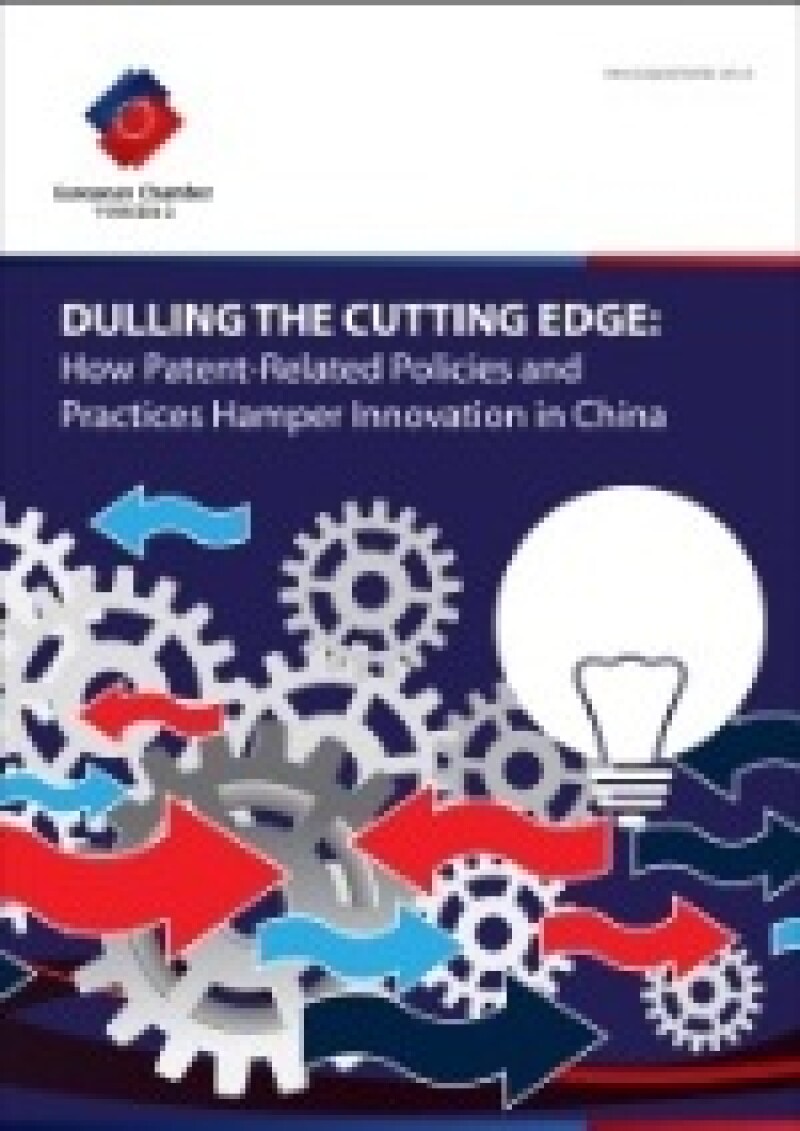Chinese patent applications have soared over the past five years. But many China-watchers have long suspected that both patent quality and levels of innovation lag far behind the record numbers.

Now a new report from the European Chamber of Commerce in China has provided an in-depth analysis of Chinese patent policies that appears to prove the sceptics right.
The 210-page study, Dulling the Cutting Edge: How Patent-Related Policies and Practices Hamper Innovation in China, was published last week. Here are its main conclusions:
· The strength of China’s actual innovation is “overhyped”
In particular, high levels of low-quality patents are being filed. These are defined in the report as those that do not meet or exceed the statutory requirements for patentability in China; and do not have reasonable prospects of (i) ultimately being commercialised or (ii) otherwise being transformed to contribute to social, economic and/or environmental progress in China.
· Government-set quantitative patent targets threaten levels of patent quality
The report says that targets that simply aim to raise levels of patent applications (rather than targets for patents granted or commercialised) may sometimes encourage the development and filing of low-quality patents. Over-emphasis on quantitative patent targets undermines the objective of encouraging innovation.
· Overemphasis on so-called indigenous IP limits innovation and competition
Government bodies offer some financial incentives for the development of “indigenous IP rights”. This hazy term is generally interpreted as businesses that are not majority owned by foreign enterprises. Overemphasis on “IND IP thought” indoctrinates the policymaking system by limiting the development of other policies that might be more effective in encouraging innovation; has a chilling effect on the likely transfer of IP from foreign to local firms; and could breach the WTO’s TRIPs Agreement.
· Patent adjudication and enforcement rules are problematic
The report cites a number of problems. It says that not enough weight is given to Patent Evaluation Reports in infringement proceedings, reinforcing the perception that China has a less than optimal patent adjudication system; restrictions on the numbers of pieces of admissible prior art for utility model infringement cases can make it more difficult to invalidate utility models than invention patents; and uncertainty over how IP provisions in the Anti-Monopoly Law will be applied creates a drag on the development of quality patents.
A common concern
Managing IP spoke to Chinese attorneys to gauge their reaction to the study.
“The report is correct in that some government policies may be causing this problem of lowered patent quality,” said Allen Tao of Liu, Shen & Associates. However, he argued that incentivising patent filings acts as an education system that teaches Chinese businesses how to protect their IP.
Samson Yu of Kangxin agreed. “There are some garbage patents, but the goal is in part to encourage Chinese companies to learn the process and the importance of patents. They are beginning to learn what patents are worth.”
Yu also acknowledged that he sees examples of one of the problems cited in the report: Chinese companies building their patent portfolios with utility patents of dubious quality to increase their negotiating power.
“These patents are tools for playing games,” he said.
Although anyone who has seen levels of patenting and patent acquisition in the global telecoms sector will be familiar with this game, the European Chamber of Commerce says that this phenomenon discourages companies from entering the Chinese market or trying to file higher-quality patents. The concern, they explain, is that even if many of the utility patents are of poor quality, their mere presence presents a litigation risk and may discourage companies from investing in China.
You can read an interview with Dan Prud'homme, the report's author, and Oliver Lutze, co-chair of the Chamber's IPR working group, here.










